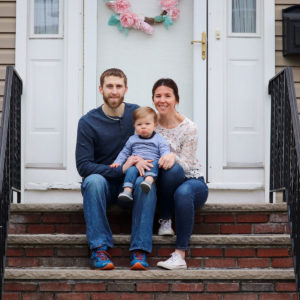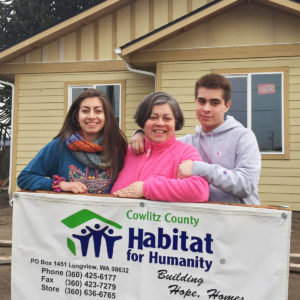Stable housing was already a complicated issue in our region, and COVID-19 is intensifying many of the systemic problems.
High costs are being compounded by widespread job losses and setbacks in the construction sector. Shelter in place mandates are also shining a light on the connection between our health and housing in ways we’ve never experienced before. Simply put, stable housing shapes our livelihoods, and that stability is increasingly at risk in a time when it’s needed most.
Many local organizations were already working to improve renter protections, encourage housing affordability and address systemic inequities. Now, those nonprofits are adapting and scaling programs to do even more work amid the COVID-19 pandemic.
To better understand how COVID-19 is threatening housing security in southwest Washington, we’ve provided insights from six SW Washington COVID Response Fund grantees.
Stable Housing During COVID-19: Six Nonprofits Providing Relief
1. Lower Columbia CAP
 Operating one of the largest rental assistance programs in Cowlitz County, this nonprofit ensures that hard-working folks can get ahead. Rent and utility assistance requests have been on the rise during the recent economic downturn. Water and electricity are increasingly expensive and necessary for those sheltering in place. Using a number of grants, including one from the COVID Response Fund, this agency scaled its assistance programs. The staff works closely with with tenants and landlords, and everyone involved is working to find common ground through this difficult time.
Operating one of the largest rental assistance programs in Cowlitz County, this nonprofit ensures that hard-working folks can get ahead. Rent and utility assistance requests have been on the rise during the recent economic downturn. Water and electricity are increasingly expensive and necessary for those sheltering in place. Using a number of grants, including one from the COVID Response Fund, this agency scaled its assistance programs. The staff works closely with with tenants and landlords, and everyone involved is working to find common ground through this difficult time.
2. Council for the Homeless
Sheltering in place is not possible for those who lack shelter, and many day-to-day supports and resources for homeless people have disappeared. That has not been the case at Council for the Homeless. This organization quickly transitioned to a remote system, increasing staff to field calls to its Housing Solutions Center and Housing Hotline. Using e-signatures, smart phone cameras and other virtual tools, they continue to help people find and maintain housing. Grants from the COVID Response Fund enabled them to place people with greater health risks into motel rooms and expand a rental assistance program for those experiencing significant financial hardships as a result of COVID-19.
3. Janus Youth Programs
This nonprofit is acutely aware of the recent economic impacts on low-income residents. Janus tenants are among those who were already feeling pinched by stagnating wages and increasing housing costs. Every year, the organization’s Clark County programs assist more than 100 homeless youth striving to find and maintain stable housing. More than half of them are also raising children. Business closures swept jobs out from under their feet, so Janus used a COVID Response Fund grant to help its residents. By providing rental assistance to past and present tenants who are experiencing this incredible setback, they as they transition into stable housing.
4. Family Promise of Clark County
Churches are the centerpiece of this organization’s operations, providing shelter for four families who are just steps away from securing stable housing. With churches closing, Family Promise had to rethink its delivery model. The solution: reserving motel rooms for the families and moving its case management online. This came with increased costs, and the COVID Response Fund is providing the bridge funding to help these families through the pandemic. Its 25 church partners are stepping up too, delivering meals, groceries, hygiene items, and even leaving notes of encouragement for the parents and special gifts for the kiddos.
5. Cowlitz County Habitat for Humanity
 COVID-19 has halted the to-face consultations that this nonprofit and its partner, the Cowlitz Neighborhood Resource Coordination Council (CNRCC), rely on to advise Kelso-Longview’s most distressed neighborhoods. Many Habitat homeowners are also facing financial challenges, which make mortgage payments extremely burdensome. As a result, Habitat requested funding from the COVID Response Fund for a mortgage relief program. In addition, the CNRCC used funding to launch its text-in project, which connects neighbors to vital resources and to one another. Even amidst these difficult times, many have offered to shop or do yard work for one another.
COVID-19 has halted the to-face consultations that this nonprofit and its partner, the Cowlitz Neighborhood Resource Coordination Council (CNRCC), rely on to advise Kelso-Longview’s most distressed neighborhoods. Many Habitat homeowners are also facing financial challenges, which make mortgage payments extremely burdensome. As a result, Habitat requested funding from the COVID Response Fund for a mortgage relief program. In addition, the CNRCC used funding to launch its text-in project, which connects neighbors to vital resources and to one another. Even amidst these difficult times, many have offered to shop or do yard work for one another.
6. Cascade AIDS Project
Each year, this agency provides housing and other social services to hundreds of people living with HIV in southwest Washington, including more than 100 who are currently unhoused. For these neighbors COVID-19 is a dire health threat, and requests for housing assistance have tripled. Staff have been working tirelessly with clients to find and maintain safe, stable housing. They also launched a virtual support group to provide strong, supportive relationships during this disconnected time. A grant from the COVID Response Fund is supplementing its emergency rental assistance program and providing motel vouchers to those sleeping in unstable conditions.
Giving Together to Ensure Stable Housing
COVID-19 is a true test of coordination and collaboration. From what we’re hearing, our local nonprofits are answering the call, but by no means are they acting alone. Numerous community efforts are at work, ensuring that people have safe shelter to weather this storm and whatever comes after.
As you read above, residents in Cowlitz County are helping their neighbors feel safe and cared for amidst the isolation. With many public spaces and resources closed, churches are stepping up to provide shelter, showers and other vital resources for unhoused people. Local governments are leveraging state and federal funding to make large-scale solutions possible.
Donors are contributing too. Many are giving to nonprofits like those featured in this post. Others are donating to the SW Washington COVID Response Fund, which has now provided more than $3.6 million in relief. Collectively, this funding is supporting nonprofit programs and services that improve access to food, housing, technology, and health and safety equipment.
All of these generous, innovative and compassionate efforts represent the immeasurable impact we create by working toward a shared goal. Together, we can increase our ability to meet the basic needs of people. Recognizing our strength as a collective is critical as we work to recover and rebuild our region, because our fates are tied to one another and to our ability to find and maintain stable housing for all.
